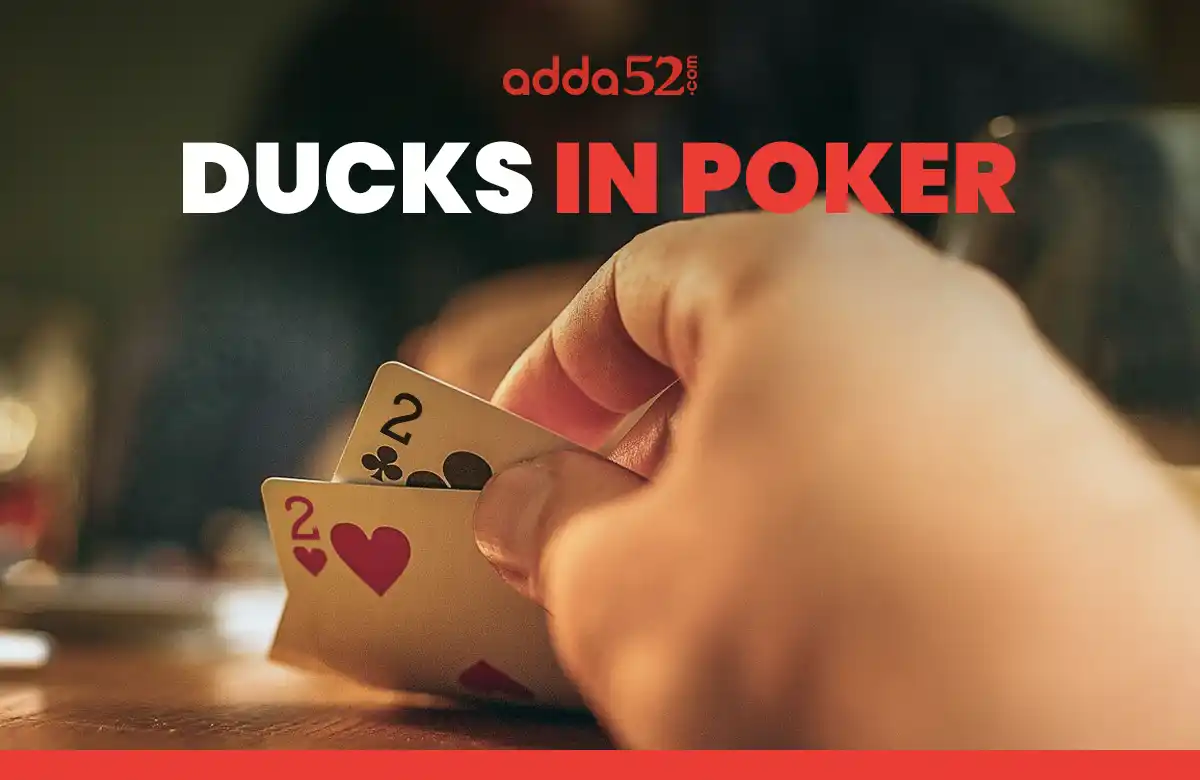
Introduction
Each hand comes with its own nickname in Poker. Some are well-known, while others are more niche. One such nickname is ‘Ducks’, referring to pocket twos (2-2). While they are the smallest pocket pair you can be dealt, Ducks have the potential to grow into a powerful hand if played wisely.
This article will explore how to turn this seemingly weak hand into a powerful weapon at the poker table.
What is Ducks in Poker?
‘Ducks’ is a fun Poker slang term for pocket deuces or a pair of 2s. This nickname arises from how the number ‘2’ visually resembles the shape of a duck. Despite being one of the lowest pocket pairs in Poker, they play a crucial role in strategy due to their ability to form a set (three of a kind) on the flop. When played wisely, this can be an incredibly strong hand.
The Appeal of Pocket Deuces
Players will call a raise with pocket deuces to hit a set on the flop. A set is a strong hand in poker, especially when it's not obvious. For instance, if your opponent has an overpair or high card, they might not suspect you hit your set. This can enable you to extract value from them, particularly if they hold a hand they feel confident about.
Implied Odds and Set Mining:
Set mining is a strategy where you play a small pocket pair, such as pocket twos, with the aim of hitting three-of-a-kind (a set) on the flop. The idea is to make a preflop call, anticipating that if you land your set, the pot will be substantial enough to ensure long-term profitability from this move.
Implied odds are critical to understanding whether pocket deuces are worth calling a raise. This refers to the potential future bets you can win if you hit your set. You may win a large pot if you hit a set, especially if your opponents have overpairs, top pairs, or draws.
Example of Set Mining:
- You are in the cutoff (late position) with 2♠ 2♣.
- An opponent raises to 3x the big blind from an early position, and you call because you are hoping to hit a set.
- The flop comes 2♦ 8♠ 10♣, giving you a set of deuces. You now have a powerful hand. You will likely bet to extract value, especially if your opponent holds a hand like a top pair or an overpair, which they may feel confident in.
- If your opponent raises or bets, you can often slow-play your set and raise to extract maximum value from their top pair or two-pair hand.
Preflop Strategy with Pocket Deuces
Pocket deuces are a marginal hand, meaning they don’t offer much immediate value unless they hit the right flop. Therefore, preflop play is crucial, and your position at the table will influence your decision-making process.
1. Playing Pocket Deuces in Early Position:
- Early position is a challenging spot to play pocket deuces because you have little information about the other player's actions. Since pocket deuces are a small pair, you’re likely facing opponents with better hands, and raising or calling a raise from an early position can often result in a loss.
- Folding pocket deuces is the safest option in an early position unless the table is extremely passive. Pocket deuces are easily dominated by higher pocket pairs (like pocket 10s, jacks, or queens) and can be difficult to play profitably from an early position.
2. Playing Pocket Deuces in the Middle Position:
- The middle position offers more flexibility because you have more information about players' actions in earlier positions. If no one has raised and the table is playing passively, you may call a small raise or even raise yourself in a loose game where you expect opponents to make mistakes.
- If there has been a raise from a tight player, you might prefer to fold, as calling will be unprofitable if the player is holding a premium hand.
3. Playing Pocket Deuces in Late Position:
- Late position is the best time to play pocket deuce, as you can see how all the other players act before you decide. You have more information about their range and the likelihood of getting a cheap flop.
- In this position, you can call a small raise, especially in cash games or tournaments with deep stacks. You can also raise in loose games to potentially steal the blinds, but doing so with pocket deuces is more about stealing pots than trying to hit a set.
4. Against Raises:
- If an opponent raises preflop (especially from tight players), pocket deuces are generally a fold unless you are in position or the pot odds justify a call.
- Pocket deuces are particularly bad when facing multiple raises or a large raise, as the likelihood of hitting a set and winning a large pot diminishes.
Postflop Strategy with Pocket Deuces
1. When You Hit a Set:
- If you hit a set on the flop, pocket deuces become a strong hand, as you now have three of a kind. The strength of your hand will largely depend on the board texture and the actions of your opponents.
- Bet for Value: If the flop has high cards or straight/flush draws on the board, you should bet to extract value from your opponents, who might hold top pairs or overpairs.
- Slow-Play: In some situations, you may want to slow-play your set. For example, if the board is somewhat dry (not many draws), you may want to check to induce bluffs or smaller bets from opponents who may think they have the best hand.
- Be cautious if the board is connected or if there are overcards (like a K♠ Q♣ 10♦ flop) because the chances of someone holding a straight or two-pair are higher.
2. When You Miss the Set:
- If the flop does not help you, pocket deuces are a weak pair of 2s. In most cases, you should check and fold if there’s significant betting.
- Sometimes, you may want to bluff or make a small semi-bluff bet, especially if the board is low and dry. This may convince your opponents to fold hands that are weak or have missed the flop as well.
Common Mistakes When Playing Pocket Deuces
-
Overplaying Pocket Deuces:
- A common mistake with pocket deuce is overvaluing them, especially when you don’t have favourable pot odds or implied odds. Don’t fall into the trap of thinking that pocket deuces will always win if you hit a set — you should fold them in many cases when faced with raises from strong opponents.
-
Ignoring Position and Implied Odds:
- Playing pocket deuces out of position or when the implied odds are unfavourable can lead to losses. Always evaluate whether your stack size and the size of the pot justify the call.
-
Not Folding When Appropriate:
- Pocket deuces are a weak hand when you miss the set. If the board is unfavourable (e.g., it has high cards or potential straights), it's often best to fold unless the pot odds are favourable for a call or you can plausibly bluff.
Frequently Asked Questions
What are ducks in Poker?
‘Ducks’ is the slang term for pocket deuces (2♠ 2♣), the lowest pocket pair. While weak preflop, their value lies in hitting a set (three of a kind) on the flop. They can win large pots if played correctly due to their deceptive nature when you hit.
Should I always play pocket deuces preflop?
No, pocket deuces are situational. Play them in a late position, where you can call small raises or limp to see a cheap flop. Avoid playing them in an early position, especially against tight opponents or large raises.
What are the odds of hitting a set with pocket deuces?
The odds of flopping a set with pocket deuces are approximately 11.8% or 1 in 8.5 flops. This makes set mining profitable if the pot odds and implied odds justify calling pre-flop.
Conclusion
Ducks are a tricky hand to play, and their strength largely depends on hitting a set on the flop. While they are one of the weakest pocket pairs, they offer the potential for large payouts if played correctly. Remember, understanding how to extract value when you hit your set is critical to mastering pocket deuces in Poker.
